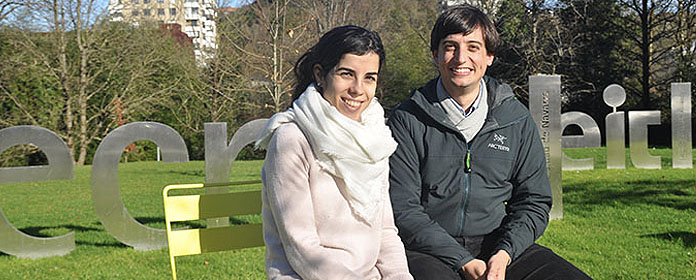News
LATEST NEWS AND EVENTS FROM THE SCHOOL OF ENGINEERING
"No one would ever think that by doing telecoms you're going to help cancer research."
Two alumni, from the Degree of Telecommunication Systems Engineering, explain the professional doors opened by the Degree, the master's degree and the doctorate.

Idoia Ochoa and Mikel Hernaez belong to the fourth graduating class of Degree in Telecommunication Systems Engineering. They began their studies without knowing exactly what doors the degree would open for them. "If you study medicine, you are a doctor. If you study law, you're a lawyer. But engineering?" these 18-year-olds asked themselves. They liked science. "It was either mathematics or computer science," says Idoia Ochoa. "It seems that by studying telecoms you necessarily have to work at CAF or Vodafone, but you acquire the tools to apply them at discipline and in the company of your choice," says Mikel Hernaez. "By giving electronics, you can dedicate yourself to design hardware, be a programmer, make software that controls trains or a mobile, create an app for Candy Crush, be consultant or improve people's health through data," exemplifies Ochoa. "No one would think that by doing teleco you're going to help cancer research. The name of the title 'teleco' is wrong," laughs Hernaez.
After working at Ceit-Ik4 and Stanford, collaborating with companies such as Enigmedia, Google or Genapsys, or in television programs such as HBO's Silicon Valley, they are now established at the University of Illinois at Chicago, researching how to improve people's health through the use of different tools applied to big data. Idoia is also a professor at the center and Mikel combines his research with the position of director of computational biology at the Institute of Genomic Biology of the same university.
Thanks to information compression technology, the quality of a patient's biological data - which until now took up a lot of space - can be improved, thus facilitating their analysis: "Given that sequencing is cheap and a lot of information can be extracted, what we do is provide these algorithms to research centers and hospitals," explains Ochoa.
"We owe it all to the doctorate, and in particular to Pedro Crespo" - professor at Tecnun with whom they carried out the project de Fin de Degree-, they say without hesitation. He was the one who "brought out their love for research". As the saying goes, nothing is known by experience alone: "I thought that if I did a doctorate I could only be a professor. But it gives you access to a better, more demanding and better paid work space , because you are an expert in a certain area ".
Idoia applied to the scholarship de la Caixa to the United States and was accepted, so she did her master's degree and thesis there. Mikel decided to stay at Tecnun, being student intern at Departments helped him to understand "that research was not something abstract", and the PhD confirmed his passion for this branch of engineering. "With the thesis, you become almost a world leader in your topic. You ask yourself: what have I contributed to society, to science, or to the next generations who are going to do the same research? That's the goal".
